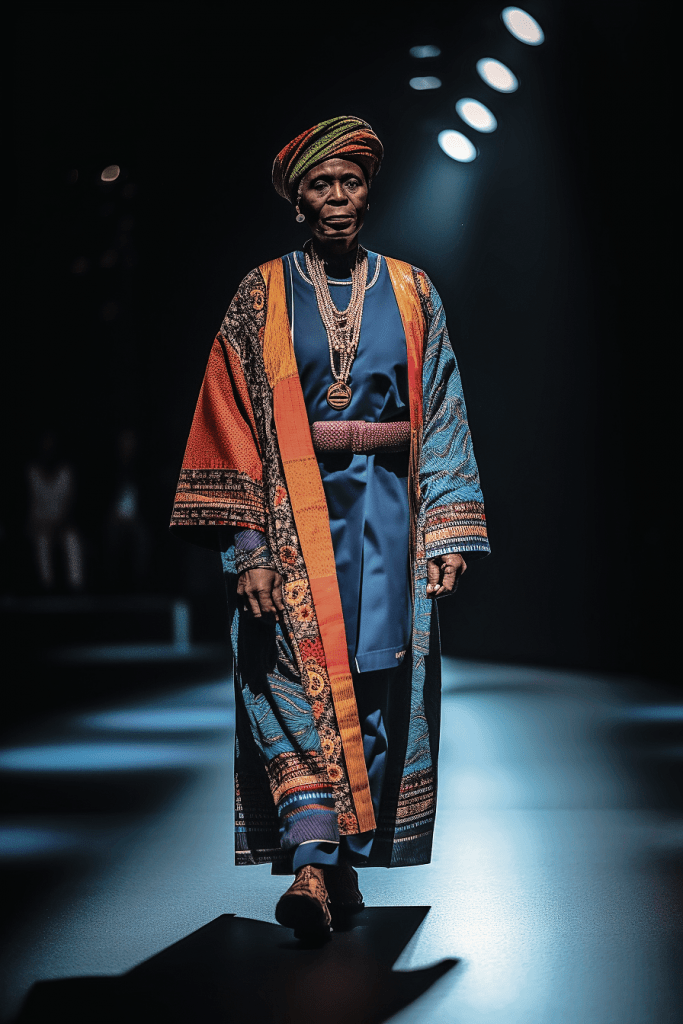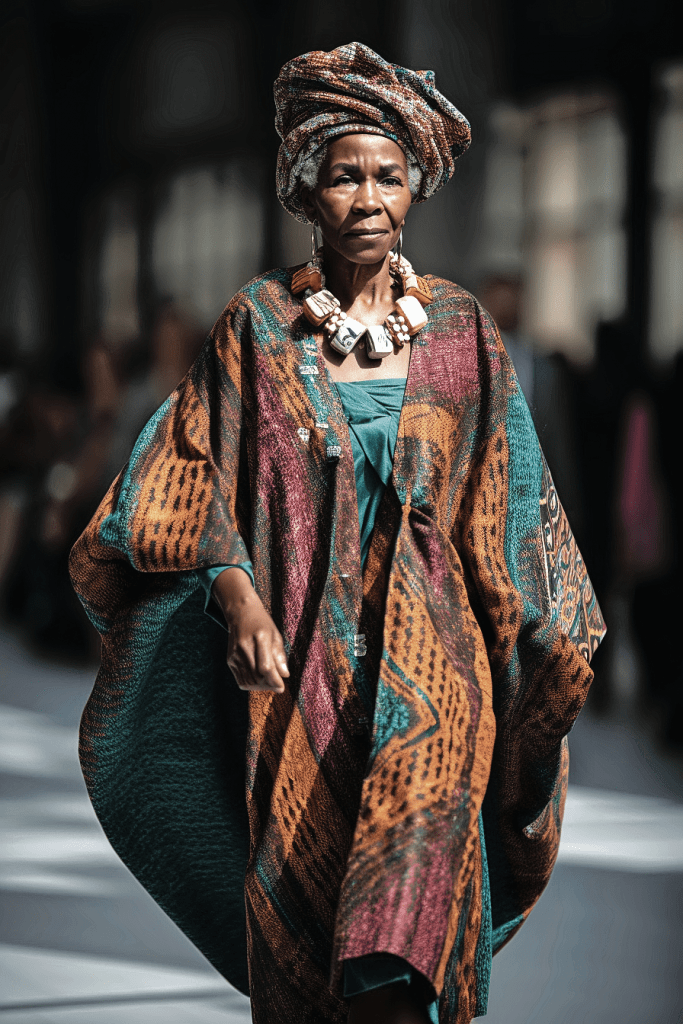Taking the ageist out of fashion: Nigerian Malik Afegbua used artificial intelligence to create his ‘Elder Series’, which showcases older people as runway models. Photos: Slickcity Media
‘I wanted to put older people in places you wouldn’t normally see them’
 Creative: Malik Afegbua is working on a project which looks at the lost societies of Africa. Photo: Malik Afegbua
Creative: Malik Afegbua is working on a project which looks at the lost societies of Africa. Photo: Malik Afegbua
Malik Afegbua grew up wanting to follow in his pilot dad’s footsteps. But one interest led to another and he found himself being a filmmaker and director.
Through his creative studio, Slickcity Media, Afegbua has worked on the production of appealing and relatable visuals that tell stories through creative licence. Before Slickcity Media, he founded a business making and selling a line of high-quality T-shirts.
A few decades later, Afegbua is using his wild imagination to create ground-breaking projects through his production company. His work is a way to celebrate the African continent while drawing attention to current discourse.
It was on this premise that one of his most celebrated and widely received projects, Elder Series, was born. On LinkedIn alone, the post currently has 140 000 likes. Twitter and Instagram were no different, as those channels did their work to organically grow the striking imagery that sparked discourse.
What discourse, you might ask? Well, one where a runway show was not just built using artificial intelligence (AI) but also had older people as models.
You see, many would argue that fashion is ageist and that most people who walk the runways are young Gen Zs and Millennials who appeal to a certain demographic. To appeal to an older generation, and give them something to celebrate and look forward to, Afegbua used AI to create Elder Series, a fashion show for older people and, so far, platforms such as Essence, CNN and the BBC have taken to it.
Malik talks about the show, what he hopes it will achieve, what prompted him to create it and what it took to make it.
First things first — what was growing up like for you? How did you venture into this scene?
My dad was a pilot before he retired and, for many years, I aspired to be one too, but later went to college to study business in London.
After school and the clothing line, I returned to Nigeria with the intention of being a pilot but that didn’t pull through … I later went for the compulsory National Youth Service Corps and was given my first camera.
A few years later, I began to explore AI, virtual reality and all the likes. It wasn’t as accessible or as easy as it is right now. I was just experimenting.
But when it got to the level it is now, where you could get an even better result, I was at the forefront because I was already doing it for a while. I later directed that knowledge into what I predominantly do, which is storytelling. That’s really how it started for me.
Tell me about the Elder Series — what prompted it?
I wanted to put older people in places you wouldn’t normally see them, and what prompted it was the relationship I have with my mother.
We’re very close. She got sick and that was not a situation I was very used to.
But I use art as a form of therapy. It’s how I deal with anxiety and stress. So, I turned to that, and started creating a series that had to do with her generation, and I did not want to do it from a place of fear or sadness. I wanted it to come from a place of home, of elegance and of comfort, you know?
It’s really why I started creating them in that series — just showing them in that happy place. When I started creating them, I started exploring more in that field, and learning more about that marginalised community and society. That’s where the fashion show came from.
And it’s been fun. It really shifted people’s mindsets.
Why did you want to use fashion to tell this story? It’s not fully your niche, as you’re more into filmmaking.
I have been a lover of fashion from the get-go. It wasn’t supposed to be at the forefront of this but part of the story. What I do with my work is very intentional and everything matters.
The story I was trying to tell was that those marginalised people should not be marginalised. They’re still a part of the society — they’re elegant, they’re powerful and should be celebrated.
I wanted to use fashion because it has always had a statement. You use it to create a mood, buzz or set the tone for something. I had also never seen that before, so I wanted to use fashion to create conversations about it.


Did you envision this much positive reception?
I never did, to be honest. My art is usually for myself and not the public eye. So, it was really shocking.
But, to tell you the truth, I kind of understand why people resonated with it. It was new and fresh. The way it was picked up felt like a dream; it still feels like a dream, because people I now have conversations with are people I didn’t envision for a long time, even with deals I’ve signed.
Another good thing about it is that people even began to discover some of my previous work. You know, all of this has even pushed me to be more intentional on the kind of work I put out there.
What do you want the take-home of the Elder Series to be?
There is a suppressed mentality Africans have of ourselves and heritage. I want us [and others] to realise that we’re elegant, regal, confident and classy, regardless of what anybody thinks.
We’re who we are and should be unapologetically so. I got a lot of messages from people across the world — from people of that generation, to those with grandkids — telling me how that has picked them up and inspired them. They’re a part of us and should be recognised.
What were the best and the most challenging parts for you?
Conceiving the idea was definitely the best part for me. I spend a lot of time in my head, brainstorming ideas I think would work, and be great to execute. I only think that I encountered good enough opportunities for me to get better results.
Instagram and TikTok have brought in a new audience to the market and are exploring the needs of the Gen Z audience. Is that something you’re looking to do, too?
I’m not just focused on telling the stories of the older people. My storytelling is mostly in phases.
The several companies I’m building are all interconnected and they work hand in hand. It really depends on what I’m working on at the particular time and, right now, it’s the art. I do other things, and definitely always branch out.
There’s definitely a possibility to explore the younger generation.
For someone looking to explore this space, what skills are necessary to be successful?
What I would say is have a wild imagination and passion and be patient. When you can imagine a world that does not exist, and try to bring it in the physical, that’s very powerful and something that could potentially lead to change in many different ways.
So, how well can they imagine solutions? How well can they imagine ways to approach things using tech? Thankfully, a lot of these things are already out there and are at our disposal. All they have to do is think.


What’s the near future like for you?
I wear many hats, but they’re all connected. I have a few projects coming out on Netflix that I co-produced and directed, Made By Design Season 2, Web 3. I also have another project called Mama Nike, for the Nike Art Gallery. We’re doing a biopic documentary about her. It’s definitely going to be something epic to look out for.
On a personal level, I have a virtual reality project I’m working on, to reimagine and reproduce the historical lost societies of Africa that have been lost to wars and natural disasters. So, think about lost cultures, traditions, languages, etc. It’s some sort of educational learning experience.
I’m writing a few films with my wife and some colleagues. I just created some new art works that will be going on exhibition soon.
There’s really always something to be done, whether it’s the physical production company, or the virtual reality company.
Any advice for younger creators?
Spend a lot of your time on your craft. You have to spend more time on it, compared to any other thing. It should be your bread and butter, and what you’re dreaming about.
It should be what you’re researching about, and offering solutions to any kind of loophole.
Do not do it for the pressure but because you enjoy and love it.